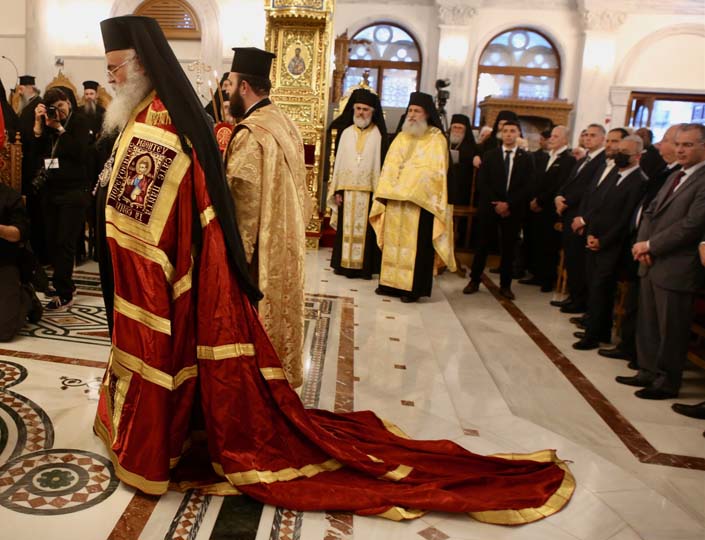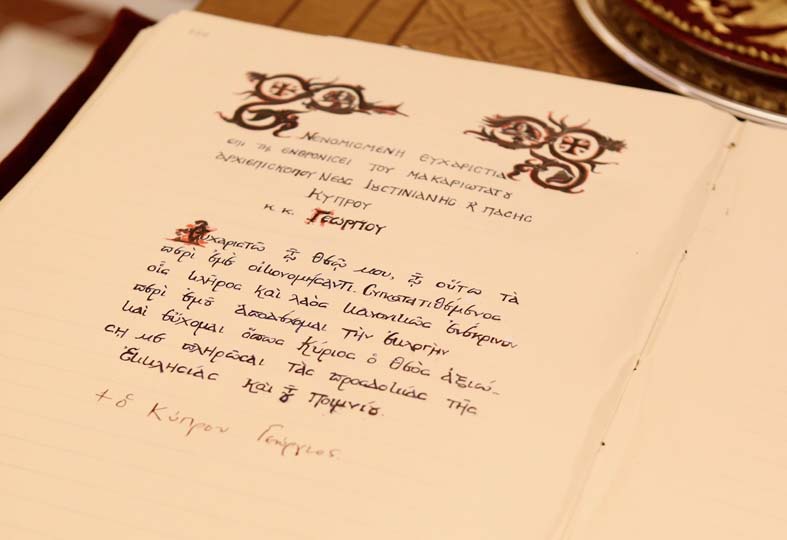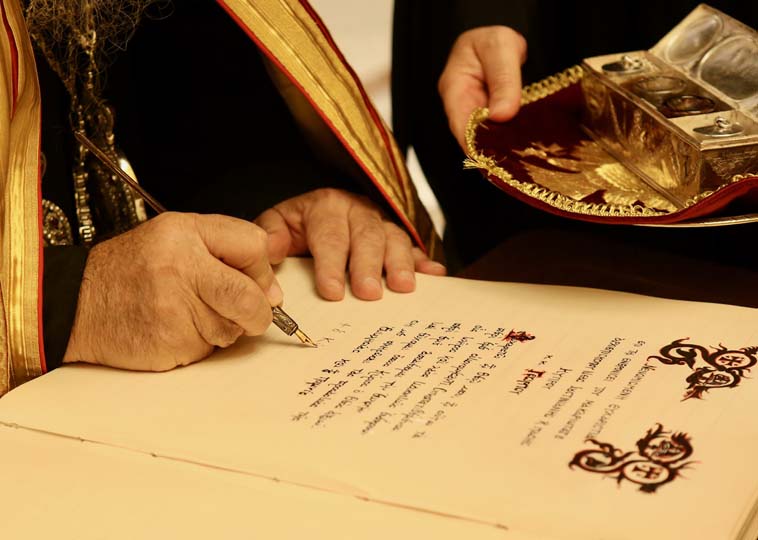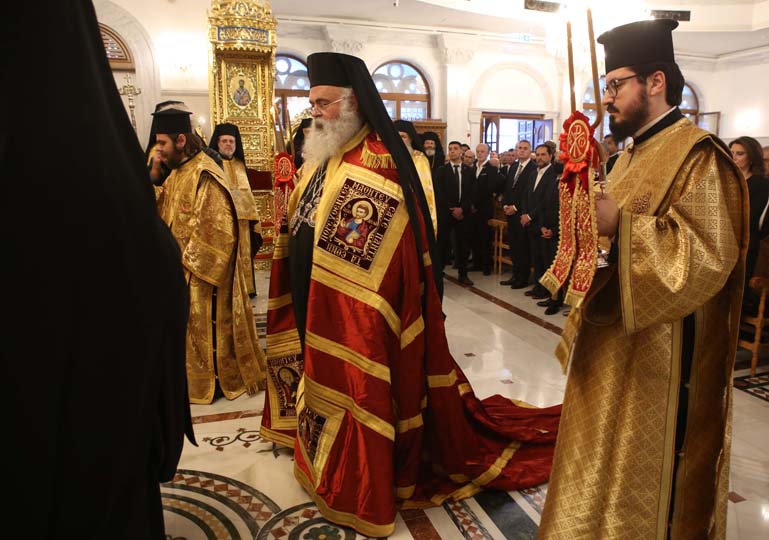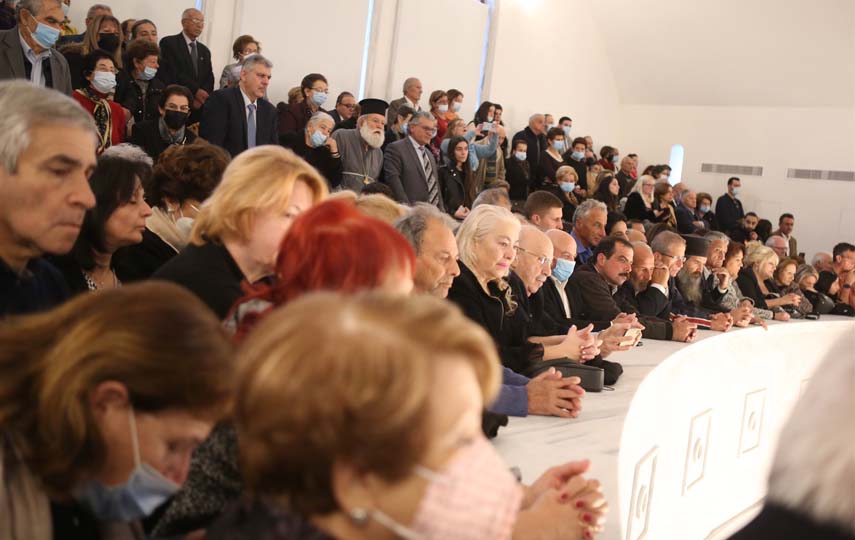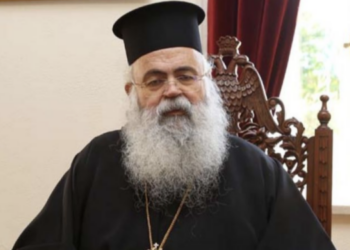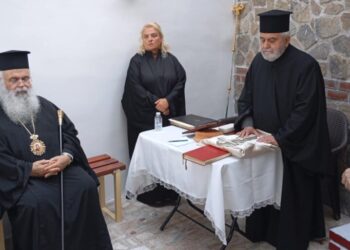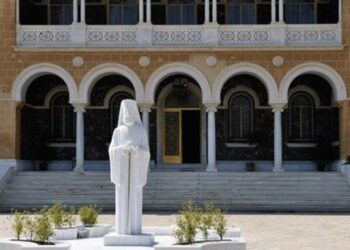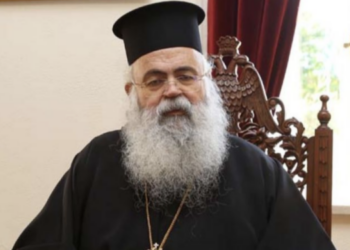The Church of Cyprus is turning a new page with the enthronement of the 76th Archbishop of Cyprus, George. The Archbishop of Cyprus took up his duties in the most official manner, before the clergy and the people.
The ceremony was attended by the President of the Republic of Cyprus Nicos Anastasiades, the President of the House of Representatives Annita Demetriou, ministers, state officials, leaders, and representatives of political parties.
Regarding the Primates and representatives of other Orthodox Patriarchates and Autocephalous Churches, Archbishop Ieronymos of Athens and All Greece, a delegation from the Ecumenical Patriarchate, as well as representatives of the Autocephalous Church of Ukraine attended the ceremony.
As Archbishop George said, among other things, in his enthronement speech, “for Cyprus and its Archbishop, the cross remains a cross of martyrdom, the chlamys becomes a rag with which to cover the wounds of the people, the crown of thorns becomes a visible sign of the onerous slavery of our country, and the reed is the means by which the acid of bitter slavery is transmitted to our people.”
As Primate of the Church in an unredeemed Greek place, the Archbishop said that he is particularly concerned with the issues of education as an essential element of the life and survival of a people. “We are not asking, nor are we trying to blackmail, the guidance of the government of the country on education issues, nor on other issues. But we do not give up the right to have an opinion on the most pressing issues of the country and to freely expose it, as the last citizen has today,” he said.
Speaking also on the national issue, he said that today, when we are in danger as never before from Turkish bulimia, which does not hide its aspirations for conquest and Turkification of the whole of Cyprus, the Church cannot stand in the stands as a mere spectator.
“The government of the Republic will be able to count on our support in claiming the rights of our people and the liberation of our occupied territories. We will not hesitate, however, to point out and control any diversion and we will fight to prevent solutions that will jeopardize our survival on the ancestral land,” he stressed on the issue.
He added that the Church will actively contribute, in consultation with the competent authorities of the state, to the defense shielding of Cyprus, while calling for the activation of the doctrine of the united defense area of Greece-Cyprus, which, as he said, will satisfy the people’s sense of security, will prevent new expansionist moves by Turkey and will preserve and consolidate the desire for liberation.
Archbishop Ieronymos to Archbishop of Cyprus: “I believe that your ministry will be effective and fruitful”
Archbishop Ieronymos of Athens and All Greece expressed the conviction that the ministry of Archbishop George will be “always useful and fruitful”, especially in ecclesiastical issues related to the identity and unity of the church and related to the destination and meaning of human existence, during his address at the enthronement ceremony.
“You are assuming this ecclesiastical responsibility at a difficult time globally,” he said.
“Of course, one could say that humans are always more or less characterized by instability and fluidity. But the fluidity of modern culture with its digital progress is unprecedented,” he added.
He went on to say that “a new worldview has now been created, completely secularized in relation to the so-called traditional. This worldview affects everything and especially our perception of people.”
It is no coincidence, he noted, “that many claim that we have now entered the age of meta-humanity.”
According to him, “this fluidity and volatility do not leave the traditional Christian way of life unaffected. A new pervasive religiosity claims to be established, new habits are adopted by Christians as well.”
In addition, he added, “you also have to face the consequences of the Turkish invasion of 1974, which remain incurable.”
“Walking in the footsteps of your great predecessors, who were characterized by genuine ecclesiastical ethos and patriotism, and relying on the grace of the Triune God, I believe that your ministry will be always useful and fruitful, especially in ecclesiastical matters.
Issues concerning the identity and unity of the church and related to the destination and meaning of human existence,” he noted.
With these few thoughts, I wish you every success in your high mission. Axios,” Archbishop Ieronymos concluded.
Ecumenical Patriarch: “Give yourself to the common struggle for the protection of the faith”
In a written message read by Archbishop Nikitas of Thyateira and Great Britain, Ecumenical Patriarch Bartholomew “welcomed” the enthronement of the new primate of the Orthodox Church of Cyprus, inviting him to give himself to the church “in the common struggle for the protection of the faith in the present era.”
Addressing the new Archbishop of Cyprus as “beloved and most precious brother and concelebrated”, the Ecumenical Patriarch in his message pointed out that he perceives “with deep emotion and just joy” the appointment of the new Archbishop of Cyprus.
In his message, the Ecumenical Patriarch makes a reference “with deep emotion” to the former Archbishop Chrysostom, stressing that he “fell to the earth to bear many fruits in the Kingdom of God.”
According to the Ecumenical Patriarch, the new Archbishop is called to continue the work of Chrysostomos “as Primate now, bearer of the victory of the Resurrection, giving birth and teaching Christ in the hearts of the clergy and the people.”
“You are taking over the Primates of one of the most historic Churches in the world, for which the Church of Constantinople has fervently fought, protected, and supported, as it will continue to do,” Ecumenical Patriarch Bartholomew said in his message, adding that “you are also called to become a bearer of this Tradition, proven, not only by words, but also by deeds, as a healer of the ecclesiologically correct opinion of the Orthodox Church, to give yourself to the Church, in the common struggle for the protection of the faith in the present era, as it is shaken, not so much because of the different dogmatic beliefs, but because of the”new doctrine” of the nation and the novel ecclesiology of the heresy of ethnophyletism.
He then noted that “our struggle is persistent and serious, as those who have secular interests from such an alteration project our movements as supposedly unorthodox and deceive faithful Christians in a completely slanderous and unfair way.”
“But you and I don’t do that. We have seen again your generous ecclesiastical ethos. We have the hope, or rather the certainty, that in your person we have found a warm companion, ” the Ecumenical Patriarch stressed.
“From the Holy Patriarchal Church of the Holy Great Martyr George the Trophy-bearer, our heavenly patron, accepting unreservedly the divinely inspired, with canonical votes, your election for which we warmly congratulate you, and we write your name in the Diptychs of our Eastern Orthodox Church as Archbishop of Cyprus,” he concluded.
Archbishop George of Cyprus: Our country is at the ultimate risk of Turkification
In his enthronement speech, among other things, the Archbishop of Cyprus referred to his future plans and wanted to make clear that he will continue the charitable work of the Church for those in need.
“To those who find it difficult due to the economic recession to cope with the demands of life, to those who are unable to take care of their health, to those who wonder to educate their children. The social work of the Church will also be expanded. The announcements for measures against the low birth rate, which is a national problem, and the creation of student residences to support the most deprived students are immediately implemented, ” he said.
He also noted that he will continue to state the Church’s position on the key issues of research and progress. He also expressed his sensitivity to the issues of Education, considering that it is an essential element of the life and survival of a people.
Elsewhere, the 76th Archbishop George of Cyprus underlined: “The word now in our homeland and in our grave obligations towards it. Its suffering is, indeed, unspeakable, even though it was called “Olbia,” perhaps euphemistically. Persians and Phoenicians, Arabs and Latins, Turks and English, left visible on its body the traces of their tyrannical passage.
Today it runs the ultimate risk, the risk of Turkification. In these difficult times, when our homeland is surrounded by “many dogs” and a “synagogue of the wicked”, the vigilance of everyone, especially the Church, is imperative. The role of the Church may be primarily spiritual, but in this case, it is not only the homeland but also the faith that is at stake. And the Church knows very well that “you should have practiced the latter, without neglecting the former” (Matt. 23, 23). After all, who can convince the ordinary Greek that his faith in Christ is separated from his identity as a Greek?
Personally, I fear a possible future criticism that would value our generation as inferior to the circumstances and as fatal for Cyprus. That is why we must fight with all our might to thwart the Turkish targets around Cyprus. We are not a newcomer to history. We have a glorious historical course of three and a half thousand years.
We have the depth of a millennial civilization. Greek history, although it is one and continuous and protected by the Holy Cross, has identified its steps with Orthodoxy for two thousand years. Greek Orthodoxy served as a shield of protection, which preserved the cultural and national identity of the Cypriot people and did not allow them to be assimilated by their conquerors.
For us Greeks of Cyprus, in all the long centuries of slavery, Orthodoxy was more than a religious dogma. It was the spiritual context in which their national consciousness, their whole world was expressed, enclosing in it the glorious past and hopes of redemption. Speaking also on the national issue, he said that today, when we are in danger as never before from Turkish bulimia, which does not hide its aspirations for conquest and Turkification of the whole of Cyprus, the Church cannot stand in the stands as a mere spectator.
If in order to keep the place Greek, through the centuries of black slavery, the Church did not count sacrifices and bloodshed, is it possible to be deaf today to the grief of our ancestors and the agonizing search for the help of its children? Can it erase or overlook the occupation, the refugees, the missing persons, and the destruction of our sanctuaries and saints?
The Church, the bearer and defender of the values of justice, freedom, and democracy, cannot consent in any way and under any circumstances to the acceptance of a solution that does not provide, for all the lawful inhabitants of Cyprus, respect for human rights and basic freedoms enjoyed by all Europeans and the whole free world.
Nothing separates us from our Turkish Cypriot compatriots. We have lived together peacefully before and together we will live again in our common homeland. Neither does the muezzin’s voice bother us. But we are unimaginably disturbed by the illegal occupation and we are provoked by the brutal violation of our human rights by Turkey, the occupying power.”
Primates of the Church of Cyprus
During the twentieth century, we had six elections and the six Primates of the Church of Cyprus served the Archdiocese for 79 years, while for the other 21 years, the throne was vacant due to controversies and frictions between the hierarchs.
Archbishop Leontios remained on the throne for only 37 days, due to his premature death.
Kyrillos II 1909-1916, Kyrillos III 1916-1933, Leontios in 1947 for only 37 days, Makarios II 1947-1950, Makarios III 1950-1977, Chrysostomos I from 1977 until 17 May 2006, Chrysostomos II from 5 November 2006 until 7 November 2022 were elected in chronological order.
The Autocephaly of the Church of Cyprus
The Church of Cyprus is one of the oldest autocephalous churches.
When the Archbishop of Antioch, to whose subject Cyprus belonged politically, sought to abolish its autocephaly, the Cypriot bishops denounced the intervention at the Third Ecumenical Council, which met in 431 AD in Ephesus.
This Ecumenical Council established the autocephaly of the Church of Cyprus with its 8th canon.
In 478 AD, Archbishop Anthemius of Cyprus, after a vision, found the tomb and the relic of the Apostle Barnabas, on whose chest was a copy of the Gospel according to Matthew.
This Gospel was offered by Archbishop Anthemios to the Byzantine Emperor Zeno, who granted the three known imperial privileges to each Archbishop of Cyprus: To sign with cinnabar (red ink), to bring a purple cloak during the rituals, and to hold an imperial scepter instead of the episcopal scepter.
With information from philenews.com, alphanews.live, CNA



